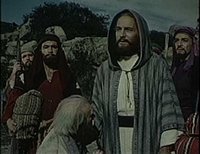Living Bible - Episodes 3 & 4 (UK version)
 I'm currently working my way through the UK DVD release of The Living Bible. (My notes on part 1 are here along with a very useful comment from WitlessD on the series as a whole). One thing that puzzled me when I first came across the release in October is why the third episode is called "Thirty Pieces of Silver", as the title would seem to apply to Judas's betrayal towards the end of the story. As it turns our it does apply to that part of the story so I'm still mystified as to why that is. According to WitlessD's list it should be episode 18. Citations are in the usual manner.
I'm currently working my way through the UK DVD release of The Living Bible. (My notes on part 1 are here along with a very useful comment from WitlessD on the series as a whole). One thing that puzzled me when I first came across the release in October is why the third episode is called "Thirty Pieces of Silver", as the title would seem to apply to Judas's betrayal towards the end of the story. As it turns our it does apply to that part of the story so I'm still mystified as to why that is. According to WitlessD's list it should be episode 18. Citations are in the usual manner.Episode 3 - Thirty Pieces of SilverNotes
Apocalyptic discourse - (Luke 21:5-19)
Passion prediction - (Mark 8:31-38)
Plot against Jesus - (Mark 14:1-2; John 11:45-53)
Anointing at Bethany - (John 12:1-8)
Judas agrees to Betray Jesus - (Mark 14:10-11)

The apocalyptic discourse is present, but, as with most portrayals of it, greatly abbreviated. However, here it particularly concentrates on the first part of Luke's discourse, notably the inclusion of the "governors and kings line from v12, which Matthew places much earlier (ch.10). This line is spoken several times by Anthony Hopkins in Peter and Paul, which draws attention to the possible manner in which Luke was using it here, namely to predict in part 1 of Luke-Acts the events that would happen in part 2 (and the possible reason why Theophilus was reading it).
After the Passion prediction, the story line reflects the first 11 verses of Mark, but expands it, by using the accounts from John, and even contradicts Mark in places. For example, the "Plot against Jesus" section occurs first in this sequence, but whereas Mark shows the Jewish leaders seeking to avoid arresting him during the Passover, the film has them choosing this time as he will be within their grasp in Jerusalem.
 By contrast the final scene where Judas decides to betray Jesus is an amalgamation of Mark's description and John's motive. The internal dialogue of Judas here reveals his motive to be part disillusionment, but equally the chance to make up for wasting three years with Jesus by earning some money.
By contrast the final scene where Judas decides to betray Jesus is an amalgamation of Mark's description and John's motive. The internal dialogue of Judas here reveals his motive to be part disillusionment, but equally the chance to make up for wasting three years with Jesus by earning some money.The "Anointing at Bethany" scene is one of those rare passages where Mark's original account bears almost as close a relation to John as the two other Synoptics despite a great deal of variation before all four accounts. The only common elements in all four stories other than Jesus's presence are the presence of a woman, that perfume was used and that there were some objections. The version here ignores Luke, the most different from the other three and uses a roughly equal number of details from each of the other three (although it included more vivid details from John than the other two).
The details of episode 4 – "Jesus and the Lepers" are as follows:
Episode 4 - Jesus and the Lepers
Leper Background - (Very loosely linked to Lev 14:1-57)
Jesus heals a single leper - (Mark 1:40-45)
Call down fire on Samaritans - (Luke 9:51-56, John 3:17)
Jesus heals 10 Lepers - (Luke 17:11-19)
 Notes
NotesLike Luke's gospel this episode includes both Jesus healing a single leper, and him healing 10 and like Luke's account, the only one who returns is a Samaritan. This ties in with Luke's theme of the gospel being received in all nations.
This episode also incorporates the rare (as far as Jesus films are concerned) incident where James and John offer to call down fire on a Samaritan town that refuses them. This incident, also from Luke, is often linked to James and John's nickname "the sons of thunder" and also comes straight after they have seen God perform miracles at their behest. They seem to have got carried away on this occasion. This story nicely offsets the pro-Samaritan slant of the later incident. However, in neither story do the Jews come out very well.
Labels: Living Bible, Living Bible Jesus, UK Living Bible













0 Comments:
Post a Comment
<< Home